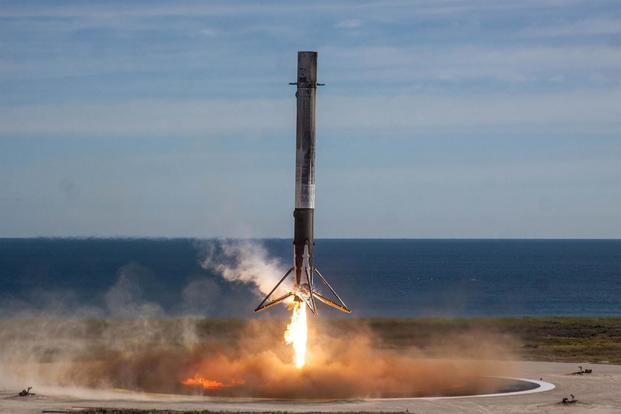Forget air mobility aircraft. U.S. troops will someday deliver cargo to forward operating locations and other bases around the world via reusable rockets, according to a top general.
"We've got to get at the speed of war. Mobility in space -- what a concept. I need rapid access to space," said Gen. Carlton D. Everhart II, head of Air Mobility Command.
Everhart, who will retire soon, spoke during a defense writers' group breakfast in Washington, D.C., laying out his vision for the command's future priorities.
"They tell me [the BFR rocket] can go around the globe in 30 minutes," he said, referring to SpaceX's next-generation reusable rocket concept. "Thirty minutes with 150 metric tons; [that's] less than the cost of [using and flying] a C-5 [Galaxy]."
Everhart said he recently met with officials from California-based SpaceX as well as launch service Virgin Orbit. He plans to meet with Jeff Bezos' aerospace company Blue Origin. His meetings took place after Air Force Chief of Staff Gen. David Goldfein tasked him with looking at how Air Mobility Command could leverage the space domain.
Related content:
- Pentagon Says 'Space Force' Report Delayed
- With Pegasus Barely Out of the Nest, Air Force Mulls New Foreign Tanker
- General Warns of Need to Boost Airlift Capacity
"This vertical lift intrigues me, and to coin a phrase, 'Space is the final frontier,' " Everhart said.
If the U.S. pre-positions cargo in space, he said, it would free up shipments by air, land and sea. Everhart said the concept could lead to cargo and port stations or a "floating island" in space that could house Humvees, ammunition, tactical equipment, building materials and other wartime supplies.
"I don't have to have people there," he said. "I just have to have cargo there [plus] automated loading systems, those types of things."
As to how the system would work, Everhart said it's up to industry partners to leverage their own technologies to supply the service with the biggest tactical advantage. Details on how cargo would be guarded from adversaries such as Russia and China are still being discussed, he added. Physical protections and cyber-hardening systems are both options.
Everhart said several internal white paper studies on the idea have been written and there is an ongoing conversation with Gen. John Raymond, commander of Air Force Space Command.
"I want to put mobility [airmen] in Space Command so they learn space, and they learn mobility," Everhard said.
It is unclear if the Air Force would keep the potential space-cargo mission itself, or if it would eventually belong to the Trump administration's proposed "Space Force."
Everhart said he would like the concept added to future budget requests quickly so lawmakers can approve the program as soon as possible.
"I have to get these concepts now if we're [talking] acquisition. I need it now. I need to look at different avenues," he said, adding that having a line in the budget by 2022 is "too late."
That's because space launch companies have the ability to move even faster, Everhart said.
"I think … the concepts are there within the next five years," he said, adding that companies like SpaceX are already looking to perform similar launches and resupply for the commercial sector.
"Five years after that, I think it will be happening," he said. "We're starting to spin this up pretty good, because ... if we don't do this and we stay just within the air domain, Air Mobility Command will become irrelevant."
-- Oriana Pawlyk can be reached at oriana.pawlyk@military.com. Follow her on Twitter at @Oriana0214.










